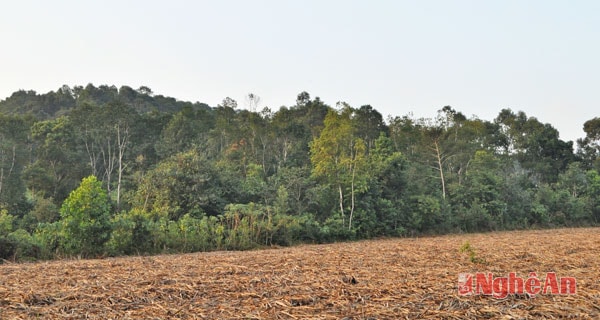Removing obstacles in forestry land allocation
(Baonghean) -Implementing the allocation of forestry land to households lacking production land, the Provincial People's Committee, after dialogue and listening to the recommendations of households, directed the People's Committees of districts to urgently organize a review of the lack of production land of the people to have a plan for land allocation. However, the handover of forestry land to households lacking production land is currently facing some difficulties that need to be resolved...
 |
| A forest near Na Phay village, Muong Noc commune, managed by Que Phong Forestry Enterprise. |
Since 2011, after many petitions, the Provincial People's Committee has directed the State Forestry Enterprises and Forest Protection Management Boards to review, separate, convert or return some forest areas to the districts for management and organize allocation to households. In total, in the past 3 years, the State Forestry Enterprises and Forest Protection Management Boards have returned 9,969 hectares, of which 31 hectares in 2011, nearly 5,500 hectares in 2012; in 2013, after people arbitrarily entered the lands of the State Forestry Enterprises to cut down and encroach on land, the Provincial People's Committee continued to review and decided to reclaim nearly 4,400 hectares (Co Ba Forestry Enterprises nearly 1,800 hectares, Dong Hop Forestry Enterprises 2,300 hectares, Que Phong Forestry Enterprises 1,400 hectares) to hand over to the districts to organize distribution to the people for production.
In fact, the land handover from farms and forestry farms to the district People's Committee has been completed. However, up to now, people have not received the land due to the slow process of handling documents. Under the strong direction of the Provincial People's Committee to speed up the progress of land allocation to the people, some districts have signed contracts with surveying consultants. The Department of Natural Resources and Environment has also mobilized and increased staff to support surveying and complete procedures for granting Land Use Right Certificates for districts that are still slow.
Through a practical survey, the biggest problem in the process of allocating forestry land is the previous management and use of land by some farms and forestry farms after being allocated land by the State was too lax, unable to manage the contract, so people used it arbitrarily or even built houses on the production land; there were cases when workers retired or died without carrying out the procedures to liquidate the contract, transfer or inherit. Currently, according to the requirements, the returned area must be recorded, surveyed from the beginning, and checked to see if the land had been allocated to anyone before making a decision to reclaim it. In addition, the area managed by the People's Committees of communes, the area of protective forest land that was temporarily allocated to households and individuals for management in the past, has now been converted to production forest land for a long time, the districts have not paid attention to land allocation, so the backlog area is large, thus affecting the progress of land allocation. Voters in Quy Chau and Que Phong reflected: Most of the area that the farms, forestry farms and the Forest Protection Management Board returned to the district to hand over to households is leopard skin forest land, which is difficult to produce or is far away and difficult to travel, measuring and organizing handover in the field is not simple at all. In addition, to measure and issue certificates of forestry land using modern methods and equipment, each district needs about 20 billion VND; if the whole province, the budget is hundreds of billions of VND... This is too large a source of funding in the difficult conditions of the province and districts, so the province has directed that it should be done as much as possible and for now it must be done manually (measuring with a rope), but this method requires a lot of human resources and the concern is that the accuracy is not high, so it is easy to cause disputes later.
Mr. Nguyen Duy Hong - Head of Quy Chau Department of Natural Resources and Environment said: Quy Chau still has 19,885 hectares of land that have not been allocated or have just been temporarily allocated. To speed up the progress of land allocation, the district has established a Steering Committee; in the near future, the working group will go to the communes to guide and make a few copies of sample declarations and procedures. After finishing this commune, it will be transferred to another commune in a rolling manner; The dossier will be handed over to the households as soon as it is completed.” From the reality of difficulties in land allocation in Chau Binh commune, Mr. Le Van Toan - Vice Chairman of the Commune People's Committee proposed: Chau Binh was assigned 1,130 hectares in 4 sub-areas by the district, but up to 1,200 households registered to be allocated land. Because everyone wants to have land, but if divided equally, each family will only have less than 1 hectare of forest, partly because of the distance, the area is too small, so many people do not want to receive it, but they cannot bear to give it up because there is no other place. Currently, the commune is considering and proposing to the district and the province a plan to allocate land to groups of households, according to which about 10 households have 1 person to be the group leader, so measuring and allocating land will be easier and faster.
Based on the above situation, along with strengthening propaganda, departments, especially the Department of Natural Resources and Environment and the Department of Agriculture and Rural Development, need to base on the actual situation to strengthen direction and guidance to remove obstacles from the grassroots to have the best plan to speed up the progress of land allocation to people.
Article and photos: Nguyen Hai






